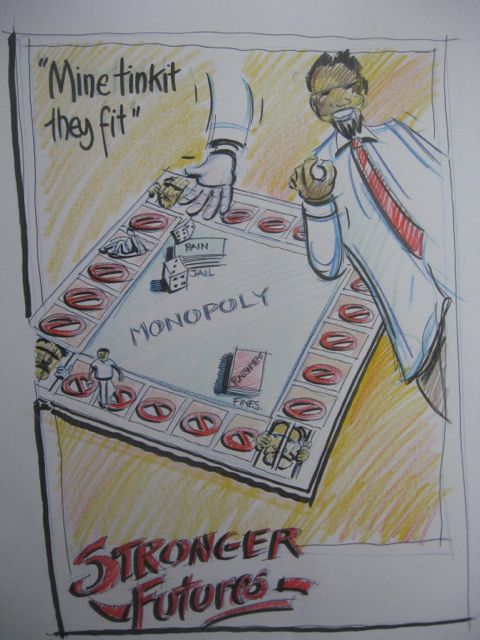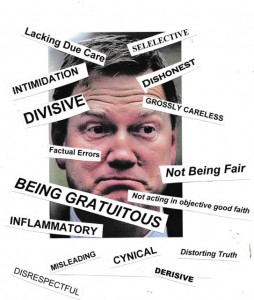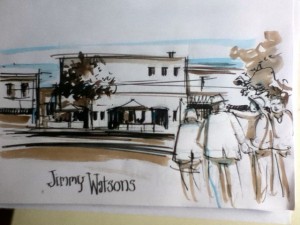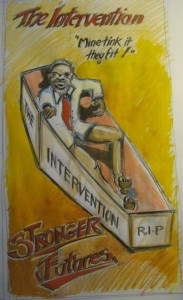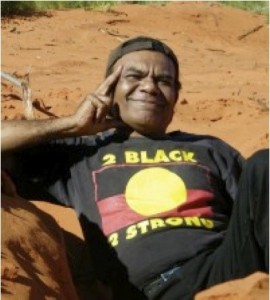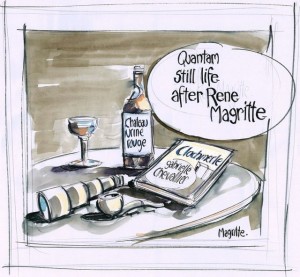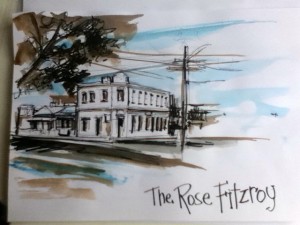We passively complicit Australians are now into the 7th year of the shameful Intervention, or “Stronger Futures” as the racist program is now called. We reprint the first part of a ‘concerned Australians’ report here. We publish the second part tomorrow. Access their site here (Their moto: withut Justice there can be no reconciliation.)
Sixth Anniversary of the Northern Territory Intervention
‘concerned Australians’
Striking the Wrong Note
Aboriginal advocate Olga Havnen, in her Lowitja O’Donoghue oration, has asked a critical question. (For a report on this speech see here). She asks what has been the psychological impact of the Intervention on Aboriginal people of the Northern Territory. It is surprising that so little attention has been given to this critical, yet in some ways tenuous, link before now.
Even before the Intervention began in June 2007, government had long planned a new approach to the ‘management’ of Aboriginal people in the Northern Territory. It was no longer part of government thinking that self-determination and Aboriginal control over land could be allowed to continue. These were the Whitlam notions of 1975 and they were no longer acceptable.
Early inklings of change occurred in 2004 with the management of grants being transferred from communities to Government’s newly established Indigenous Co-ordination Centres. More ominous were the Amendments of 2006 to the Aboriginal Land Rights Act and the memoranda of agreements that followed. Government had made it clear that it wished to re-engage itself more directly in the control of community land through leasing options as well as to open up Aboriginal land for development and mining purposes.
The plan was to empty the homelands, and this has not changed. However, it was recognised that achieving this would be politically fraught – it would need to be accomplished in a manner that would not off-side mainstream Australia. Removing Aboriginal people from their land and taking control over their communities would need to be presented in a way that Australians would believe it to be to Aboriginal advantage, whatever the tactics.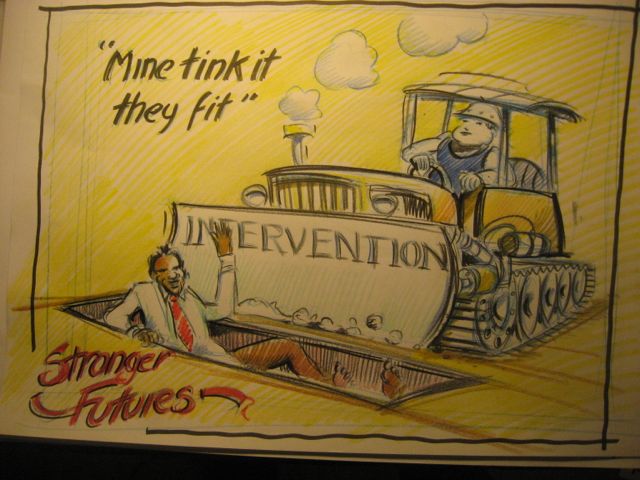
So began the campaign to discredit the people and to publicly stigmatise Aboriginal men of the Northern Territory. It would be the Minister himself who would take centre stage. It seemed that all Aboriginal men were engaged in paedophilia. The Minister readily gave television and radio interviews and declared that he knew there were paedophile rings in every Aboriginal community. Viewers were asked during their evening news broadcasts how they felt about Aboriginal children going to bed at night knowing that they were not safe. This was a government Minister engaging in a sensationalist campaign aimed at demoralising Aboriginal men and was probably the lowest point in any Government behaviour ever seen in Australia’s political history. When challenged by the NT Chief Minister to name the people involved the situation deteriorated further. With the collusion of the ABC, a senior executive service bureaucrat from the Minister’s own office posed as a youth worker from Mutitjulu, a place he had never visited, and collaborated with the Minister’s story. There could have been nothing more sordid. And even in 2009 when the CEO of the Australian Crime Commission, John Lawler, reported that his investigation had shown there were no organised paedophile rings operating in the NT, no formal apology was ever made to the Aboriginal men and their families who were brutally shamed by the false claims. Beyond this the Australian system appeared to have no way by which it could confront the former Minister for the incredible harm done by his persistent inflammatory public statements which had given rise to negative stereotyping of an ethnic group. The Minister had done his job. The Australian people had been suitably shocked and the Intervention was seen as a necessary consequence. Furthermore, Labor, that had seemingly feigned horror at the 2006 amendments to the Aboriginal Land Rights Act, would now eagerly provide bipartisan support.
What was the psychological impact of publicly shaming Aboriginal men for repulsive and unacceptable behaviours that they hadn’t engaged in? It undermined their feelings of self-worth and marginalised them. It was a direct attack on their identity. The fact that they had no way of defending themselves simply led to a state of despair. One’s sense of safety is bound uncompromisingly with a belief in justice. When that belief collapses fear of the unknown takes over.
In many ways the Intervention in all its forms has been an attack on Aboriginal identity, and continues to be. Just as the focus on paedophile rings collectively impaled all Aboriginal men to gross and disgusting acts with innocent children who needed to be protected, so did the Intervention target all communities with tales of alcohol dependence, gambling, pornography use, inefficient management, money waste, poorly maintained homes, overcrowding and poor health.
Once again, negative stigmatising of the people was as one, promoting aspects of dysfunction without providing background or explanation of situations and ensuring the most sensationalised elements of disadvantage were promoted. Measures imposed were not targeted at areas of need but were simply imposed on all as blanket measures. The oppressive restrictions were imposed on communities irrespective of whether they were perceived to be well managed and achieving their goals or whether they were struggling and in need of help. They were punished without distinction. Their individual worth was of no consequence. The intention of such measures had never been designed to assist in specific circumstances involving particular individuals or communities but as a means of taking back control from all.
People struggled to understand why they were being targeted, why they were being punished. They were fearful for many reasons but most especially because of the manner in which the Army had been engaged in a display to ‘shock and awe’. How could the so-called ‘Emergency Response’ be explained? We know from stories at the time that many grabbed their children and ran to hide in the bush in the belief that once again their children would be removed from them. Why was this cruel re-traumatising of so many allowed to happen?
Government claimed the ‘emergency’ was required to protect children from sexual abuse. While very serious concerns regarding child sexual abuse had been raised through the ‘Little Children are Sacred’ Report, the statistics showed its rate was far, far lower than in the state of New South Wales. The complex legislation that had been prepared to implement the Northern Territory Emergency Response had commenced long before the release of the report and none of it was directly aimed at the protection of young children.
Re-traumatisation has done plenty of damage. If ever there had been a growing sense of trust between Aboriginal people and the dominant race, it was blown away in 2007. The trust was gone and the fear returned. The very manner in which the Intervention was rolled out ensured greater confusion and disorientation, more like an act of counter-insurgence. Normal channels of engagement and communication were ignored. Elders became invisible; they were neither consulted nor invited to comment. Government Business Managers were installed to take decisions in communities. Responsibilities of Elders were removed from them. Controls set up to keep many communities ‘dry’ were dismantled and responsibility for alcohol control transferred to Government.
Whether a person was in debt or held a weighty savings account, they were forced to receive half their welfare payment through a plastic card which could be used only at certain shops. Capacity to financially manage money was irrelevant. Card-holders were shamed by having to stand in a separate supermarket queue.
With the demise of CDEP, the Community Development Employment Projects, those who had been employed, often for many years, found themselves on unemployment benefits. They watched on as Shire offices sent in contract workers to take over many of the tasks previously managed by the local workforce. Community council offices were closed down and stripped of all equipment. Bank accounts were frozen and responsibilities transferred from local community staff to those in Shire offices often many hundreds of kilometres away. Community programmes, often designed and developed by local people, gradually ground to a halt. Small communities were devastated. The disempowerment was unimaginable and only served to exacerbate the aimless and bewildered movements away from the security of community land towards the urban centres that offered no guarantees of shelter or protection from the social dysfunction of those who were already lost.
And the question asked, what was the psychological impact on Aboriginal people? Though little or no research has been conducted on the current situation, we do know enough from earlier studies to recognise that great psychological harm has resulted from the imposition of such targeted social oppression.
By Michele Harris for concerned Australians http://www.concernedaustralians.com.au
“Our lives begin to end the day we become silent about things that matter.” Martin Luther King Jr.

